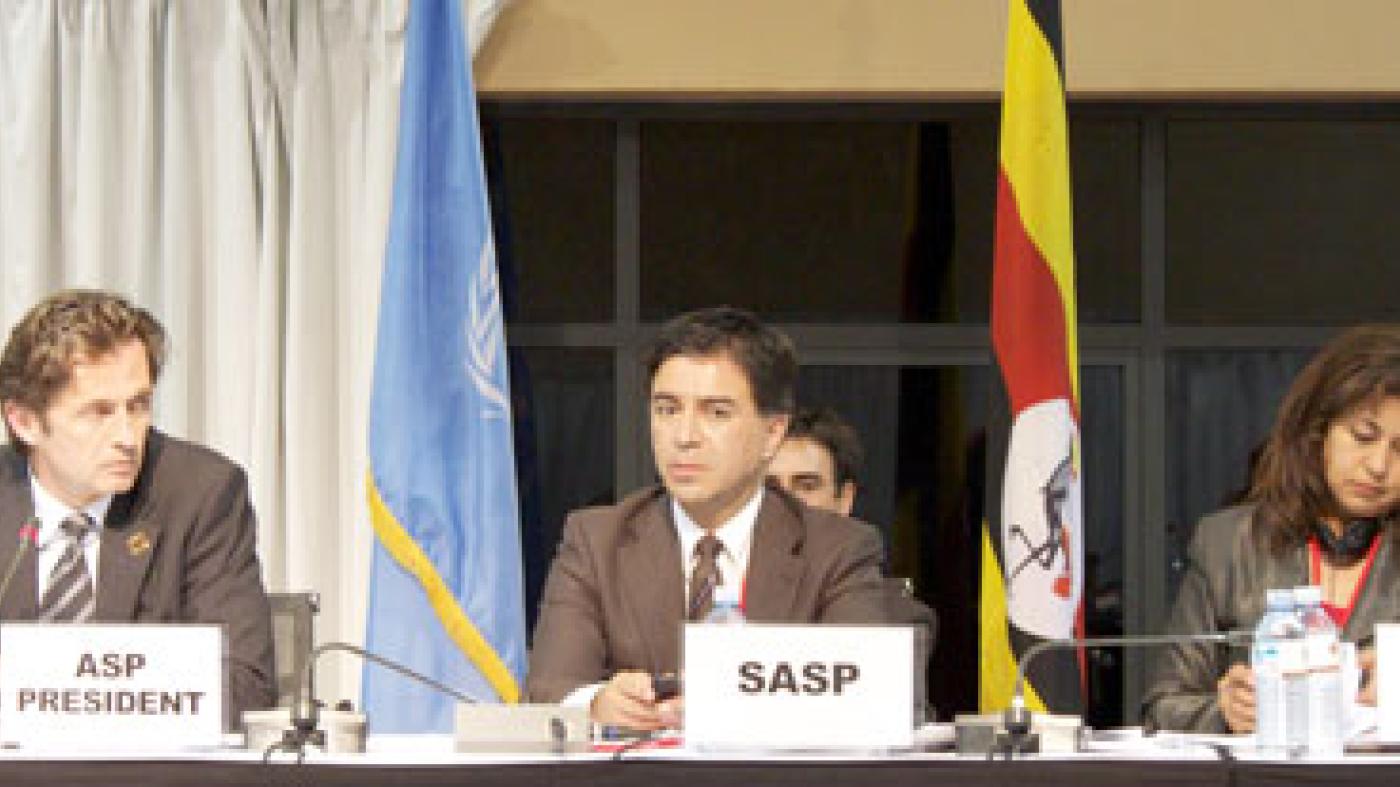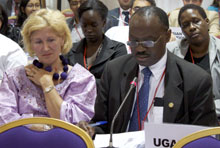
On 11 June 2010, the Review Conference of the Rome Statute concluded in Kampala, Uganda, after meeting for two weeks. Around 4600 representatives of States, and intergovernmental and non-governmental organizations attended the Conference.
Amendments to the Rome Statute

|
|
The Hon. Khiddu Makubuya, Attorney General and Minister of Justice and Constitutional Affairs of Uganda giving closing remarks. On the left, Ambassador Mirjam Blaak, Deputy Head of Mission of the Ugandan Embassy in Brussels |
The Conference adopted a resolution by which it amended the Rome Statute so as to include a definition of the crime of aggression and the conditions under which the Court could exercise jurisdiction with respect to the crime. The actual exercise of jurisdiction is subject to a decision to be taken after 1 January 2017 by the same majority of States Parties as is required for the adoption of an amendment to the Statute.
The Conference based the definition of the crime of aggression on United Nations General Assembly resolution 3314 (XXIX) of 14 December 1974, and in this context agreed to qualify as aggression, a crime committed by a political or military leader which, by its character, gravity and scale constituted a manifest violation of the Charter.
As regards the Court’s exercise of jurisdiction, the Conference agreed that a situation in which an act of aggression appeared to have occurred could be referred to the Court by the Security Council, acting under Chapter VII of the United Nations Charter, irrespective as to whether it involved States Parties or non-States Parties.
Moreover, while acknowledging the Security Council’s role in determining the existence of an act of aggression, the Conference agreed to authorize the Prosecutor, in the absence of such determination, to initiate an investigation on his own initiative or upon request from a State Party. In order to do so, however, the Prosecutor would have to obtain prior authorization from the Pre-Trial Division of the Court. Also, under these circumstances, the Court would not have jurisdiction in respect to crimes of aggression committed on the territory of non-States Parties or by their nationals or with regard to States Parties that had declared that they did not accept the Court’s jurisdiction over the crime of aggression.
The Conference also adopted a resolution by which it amended article 8 of the Rome Statute to bring under the jurisdiction of the Court the war crime of employing certain poisonous weapons and expanding bullets, asphyxiating or poisonous gases, and all analogous liquids, materials and devices, when committed in armed conflicts not of an international character.
Furthermore, the Conference adopted a resolution by which it decided to retain article 124 in its current form and agreed to again review its provisions during the fourteenth session of the Assembly of States Parties, in 2015. Article 124 allows new States Parties to opt for excluding from the Court’s jurisdiction war crimes allegedly committed by its nationals or on its territory for a period of seven years.
Stocktaking of international criminal justice
The Conference concluded its stocktaking exercise on international criminal justice with the adoption of two resolutions, a declaration and summaries of discussions.
The resolution on the impact of the Rome Statute system on victims and affected communities, inter alia, recognized, as essential components of justice, the right of victims to equal and effective access to justice, support and protection, adequate and prompt reparation for harm suffered and access to information concerning violations and redress mechanisms. Moreover, the Conference underlined the need to optimize outreach activities and called for contributions for the Trust Fund for Victims.
The Conference also adopted a resolution on the issue of complementarity, wherein it recognized the primary responsibility of States to investigate and prosecute the most serious crimes of international concern and the desirability for States to assist each other in strengthening domestic capacity to ensure that investigations and prosecutions of serious crimes of international concern can take place at the national level.
In the Declaration on Cooperation, the Conference emphasized that all States under an obligation to cooperate with the Court must do so. Particular reference was made to the crucial role that the execution of arrest warrants played in ensuring the effectiveness of the jurisdiction of the Court. Moreover, the Review Conference encouraged States Parties to continue to enhance their voluntary cooperation and to provide assistance to other States seeking to enhance their cooperation with the Court. In addition, the Conference took note of the summary of the roundtable discussion on cooperation.
The Conference further took note of the moderator’s summary of the panel discussion held on the issue of “peace and justice”. The panel highlighted the paradigm shift the Court had brought about; there was now a positive relation between peace and justice. Although tension between the two continued to exist and had to be addressed, amnesties were no longer an option for the most serious crimes under the Rome Statute.
Enforcement of sentences
In its resolution on strengthening the enforcement of sentences, the Conference called upon States to indicate to the Court their willingness to accept sentenced persons in their prison facilities and confirmed that a sentence of imprisonment may be served in prison facilities made available through an international or regional organization, mechanism or agency.
For additional information please contact
Ms. Bettina Ambach (+256 787-700-942, email: [email protected]) or
Ms. Suzan Khan (+256 787-105-832, email: [email protected]).